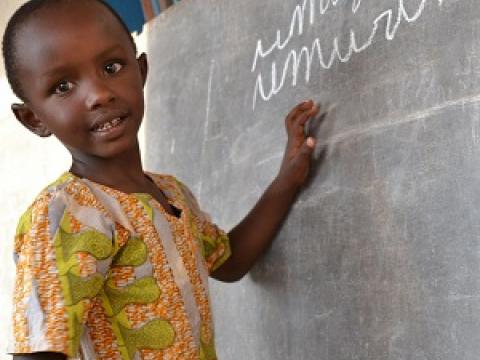Writing and Reading before School

An initial baseline reading skill assessment conducted on 560 school children from 28 schools of Cankuzo and Muyaga ADPs, eastern part of Burundi by World Vision Burundi in partnership with Save the Children reveals that only 26 per cent of the children in grade two of primary school are able to read words and paragraphs and differentiate consonants from vowels. However some children are making the difference, Mugisha, a five-year-old boy, in the first grade of Cankuzo ADP is one of them.He knew how to write and read before he started primary school thanks to World Vision’s Reading to Learn Project “Hey, Cynthia, guess! What is this letter written like this? Look!” Marie, mother of Mugisha still remembers and recounts how her son learned how to write and read. It was by repeating what he learned in a World Vision reading camp. It was also by giving puzzles to his sister Cynthia too who had already started her primary school. Mugisha wrote in the air, using his small and short index finger and asked his sister to guess which letters he was writing, Mugisha’s mother says.
“For the first time I saw him, he was writing in the air the letter ‘m’.” His mother continues looking at her son with a look of appreciation. Mugisha is a small boy of Cankuzo ADP in the eastern part of Burundi. He has small bright eyes which light up as he speaks. His story impresses his neighbourhood; he knew how to write and read before he started primary school. When he was four, he decided to follow his sister Cynthia to school, as she had already started attending primary school. “It was bothersome to stay home alone,” their mother has realized. His mother went to negotiate with school authorities where Mugisha went, to allow her son to stay in the class in which his sister studied.. Staying in class was reassuring for his mother in terms of safety, she says. Mugisha was not regular at school; a cool morning would compel him to stay in bed. He would spend weeks without going to school. Maybe at his age he did not like the rigorous rules children have to abide by while in school, his mother thinks.
A very conducive environment for him was found in a reading to learn camp. World Vision Burundi started in partnership with Save the Children, the Reading to Learn Project, known as Literacy Boost Project. Mugisha’s mother, who is a primary school teacher, proposed herself to be a volunteer teacher in a nearby reading camp. Mugisha followed her to the camp and was very interested in the games and songs they use to teach children. Some months later, his mother was astonished to find how her son was keen to learn. “At first I thought that he had memorised the content of the book I found him reading. I became convinced when I realised that by changing books he still knew to read their content and I was astonished,” his mother continues. Mugisha is one of the many examples of children who are no longer experiencing difficulties reading and writing while in school. “It’s not children’s fault.Before World Vision’s Literacy Boost Project, reading materials were greatly lacking.
“How would you expect them to know reading if they are not trained to?” Ruphine, headmistress of Cankuzo III primary school explains. To help children to access reading materials, World Vision has already created 12,000 booklets that have been distributed in 42 reading camps already set in place. More than 2300 children have now registered in the Project.
World Vision has also planned ahead for the future of this wonderful project. In partnership with World Vision Germany, two libraries have been constructed and children are meeting to read after school time and at weekends.
Local authorities are consistently asking World Vision to spread that project in the whole Province of Cankuzo. “We realize that children who participate in the reading camps perform better in class than those who don’t. It is important to give that chance to more children,” says Salvator, the Provincial Director of Education in Cankuzo Province. World Vision promises to scale up this project in five other provinces and hopes that in three years, more than 10,000 children like Mugisha will be enjoying the benefits of the Reading to Learn Project. Mugisha is now in the first grade of primary school and having attended the Reading to Learn Project finds learning other lessons is easier for him. “I know so far all the letters they teach in my class. Writing numerals is also easier for me because I am already used to drawing letters. Figures and letters are not very different.” Mugisha appreciates.